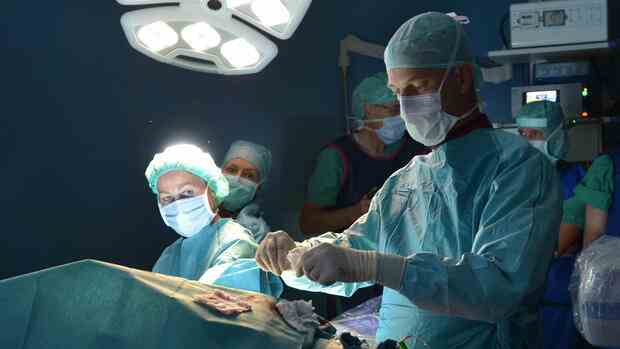In the future, more complicated interventions should only be carried out by specialized clinics.
(Photo: dpa)
Berlin There is resistance to the major hospital reform planned by Federal Health Minister Karl Lauterbach (SPD). Before the federal-state meeting this Thursday, critics warn of clinic deaths and medical undersupply in rural areas.
“Announced with unctuous words, behind the reform is the agenda of a disorderly structural adjustment of the hospital landscape, in which more and more clinics are being pushed beyond the limits of their profitability,” said Wolfgang Steiger, Secretary General of the CDU Economic Council, the Handelsblatt. The questions of chronic underfunding, the existing investment gap and the pressing shortage of skilled workers would not be solved.
Bavaria’s Health Minister Klaus Holetschek (CSU) warned that one should not risk that “needs-based supply structures will be destroyed overnight through centralized planning”. The necessary supply in the country must be maintained.
At their meeting in Berlin, the health ministers want to discuss the reform plans that Lauterbach presented at the beginning of December. The core is the partial departure from the so-called flat rates per case, according to which the health insurance companies currently reimburse clinic treatments. According to Lauterbach, they have led to treatments being geared more towards economic than medical criteria, because the clinics strive to carry out operations that are as profitable as possible.
Top jobs of the day
Find the best jobs now and
be notified by email.
According to the proposals of a government commission, clinics should instead be rewarded according to three new criteria in the future: provision of services, levels of care and service groups. Even in rural areas, at least basic care should be guaranteed – for example for basic surgical procedures and emergencies. More complex treatments, on the other hand, should be reserved for specialized hospitals, which will then also have higher case numbers.
>> Read here: Reform proposals are available – Lauterbach announces “a revolution” in the financing of hospitals
In the future, around 1,200 clinics will only be able to provide emergency care and simple treatments and will therefore hardly be able to survive, criticized the Secretary General of the CDU Economic Council. There should be so-called fixed provision flat rates if clinics provide staff, an emergency room or necessary medical technology.
But this is no more than a fig leaf, as the amounts are not sufficient, says Steiger: “Countless clinics all over the country are being brought to their knees without a higher-level concept for ensuring the care of the citizens being considered.”
The health insurance companies see promising approaches in the proposals of the expert commission: “However, the restructuring of the hospital landscape can only succeed if the reform is approached as an overall package and the federal states are involved through quality-oriented hospital planning and appropriate financing of the investment costs,” said the chairwoman of the association of the substitute funds (VDEK), Ulrike Elsner.
Investment requirement of more than six billion euros
The central associations of statutory and private health insurance and the German Hospital Society (DKG) estimate the investment needs of German hospitals at more than six billion euros. For years, however, the federal states have only covered about half of the demand, although they are legally obliged to finance the investment costs.
>> Read here: Coalition ties billions in energy cost aid for clinics and care to conditions
You also have to think about whether the costs of providing basic services should not be considered part of public services, said the managing director of the Association of Guild Health Insurance Funds (IKK), Jürgen Hohnl. “These would then have to be financed through taxes” – and not through health insurance contributions.
DKG boss Gerald Gass fears that the reform plans will come to nothing without additional funds. “According to the Commission, the reform should only redistribute the current funds,” Gass told the news portal T-Online. The economic pressure is enormous. 60 percent of the hospitals expected “some deep red numbers” for the past year. In 2023, too, the cost of houses would “rise twice as fast” as government prices, Gass said. He warned that hospital deaths “are likely to reach a new peak this year.”
Bavaria’s Health Minister Holetschek called on the federal government to support the clinics with the operating costs with an annual amount of 15 billion euros. Sustainable hospital care will not succeed through pure redistribution: “The hospital sector must be equipped with additional money.”
More: These statutory health insurance companies will increase the additional contribution in 2023
